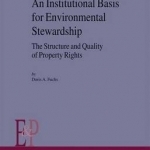An Institutional Basis for Environmental Stewardship: The Structure and Quality of Property Rights
BookThis item doesn’t have any media yet
2003 | History & Politics
What is the role of government in environmental politics and policy? The answer to this question used to be relatively clear. Government was to regulate the environmental performance of state and non-state actors, to set standards, impose charges, and establish more or less stringent criteria of acceptable behavior. With the increasing appearance of the issues of globalization and global governance in the political science literature, however, the focus has turned to the role of non-state actors. Academic research and the popular debate have identified business, non-governmental organizations (NGOs), and civil society as such as increasingly important and potentially powerful actors in the political arena. At the same time, some observers have proclaimed the influence of government to be declining. Others have argued that the role of government primarily is changing rather than declining. Those who adopt the latter perspective postulate that the new role for government in this changing political and socio-economic context is to set the framework for action.
In this perspective, government is still of fundamental importance for the functioning of the society, the economy, and political decision-making, but its role is different in that government 'merely' provides the institutional framework facilitating desired outcomes.
Related Items:
| Published by | Kluwer Academic Publishers |
| Edition | Unknown |
| ISBN | 9781402010026 |
| Language | N/A |
Images And Data Courtesy Of: Kluwer Academic Publishers.
This content (including text, images, videos and other media) is published and used in accordance
with Fair Use.
